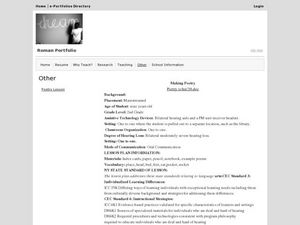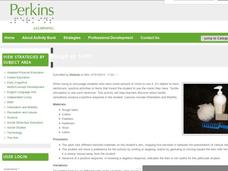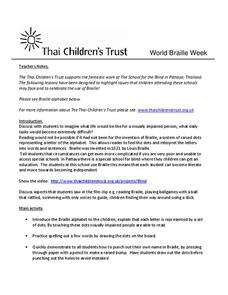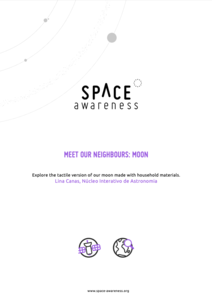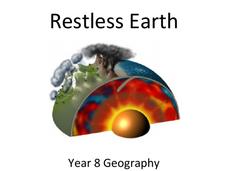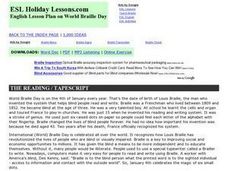Curated OER
What's In The Beans
Visually impaired learners discover objects using their sense of touch. For this exploration lesson, students with visual impairments use their sense of touch to discover objects hidden in a bowl of beans. If the student is not familiar...
Curated OER
Using Oral Traditions to Improve Verbal and Listening Skills
Students examine the role of stories in African and African-American cultures. This instructional activity is written for students with visual impairments. They
Acoustical Society of America
Good Vibrations
Visualize vibrations within the classroom. Pupils see the connection between sound and waves. The learners use a tuning fork in two different ways to demonstrate the waves associated with sound. Scholars see how the sound waves from a...
Curated OER
Making Poetry
A hearing impaired student identifies rhyming words. In this rhyming word lesson for the hearing impaired, 2nd graders read and write poetry correctly using rhyming words.
Curated OER
Rhythm and Art: Elements of Art
Students discover the three elements of art. In this visual arts lesson, students examine line, shape, and color of works by Torres-Garcia and Picasso. Students then identify the elements of art in works by other artists.
Curated OER
Adapted Physical Education: Softball
Review adaptive physical education suggestions and standards for coaching the fundamentals of softball: base running, throwing, fielding, and hitting (batting). This outline provides ideas and progressions for developing softball skills,...
Perkins School for the Blind
Rough or Soft?
When a child has some vision they need to be encouraged to use it in a positive and stimulating way. To better understand which types of tactile reinforcers your learner likes best; you'll rub different textured objects on...
Perkins School for the Blind
Please Call Me Names!
Teaching students who are blind means teaching them skills a sighted person may take for granted. To practice calling people and objects by name, learners engage in a cueing activity. The child calls for an adult by name, and then uses a...
Perkins School for the Blind
The Mystery Box - Making Observations and Collecting Data
Making observations and collecting qualitative and quantitative data is a vital skill all scientists need to practice. Help your scientists with partial and no sight learn how to use their other senses to make observations for...
Weebly
Disability Awareness Activity
Class members gain awareness of the challenges people with disabilities face, such as those with vision impairments, autism, or speech and language disabilities, as they progress through a series of engaging and informative learning...
Curated OER
The Senses: Hearing and Sight
Eighth graders consider how they use their senses. In this biology lesson plan, 8th graders understand the definition of a disability and how it affects Americans who are hearing impaired or deaf, and those Americans who are visually...
Curated OER
Thai Children's Trust
Students spell words in braille and learn how to use braille to punch out their names. For this braille lesson plan, students discuss what life would be like for a visually impaired person.
Space Awareness
Meet Our Neighbors: Moon
Since a field trip to the moon isn't possible, bring the moon to young astronomers! Participants use everyday materials to create models of the moon and represent the features on its surface. The materials serve as a tactile as well as a...
Curated OER
How Do I know That a Book Is Just Right for Me to Read?
Students choose a book for reading. In this language arts instructional activity, students take steps to evaluate a book for free reading. Students make a list of words found in the book that they are unfamiliar with.
Curated OER
The Language of Ballet
Here's a very well organized lesson plan on learning the terminology of ballet. Learn the names of some basic positions, and how to perform them. Learn the names, which happen to be in French, of basic movements in ballet. Not only are...
Geographer Online
Restless Earth
In less than 25 years, the continent of Australia moved 4.9 feet thanks to plate tectonics. The presentation introduces the idea of the layers of the earth as well as plate tectonics. It goes into why the plates move and where we believe...
Biology in Motion
Urine Concentration in 3 Easy Steps
The color, density, and smell of urine all relate to kidney function. Pupils observe the kidney controlling the concentration of water through three different steps. It mentions how each function might change the appearance and scent of...
Biology Junction
ADP, ATP, and Cellular Respiration
Hans Krebs won the Nobel Prize for his discovery of what scientists now know as the Krebs cycle. Named after him, the Krebs cycle exists as only one system of the larger set, working together to keep human bodies functioning. The...
Laboratory for Atmospheric and Space Physics
Goldilocks and the Three Planets
Venus is the second brightest object in the night sky after the moon. Here is an interesting lesson that explores three planets — Venus, Earth, and Mars — specifically their surfaces and atmospheres. Through an analysis of their spectra,...
Howard Hughes Medical Institute
Bacterial Quorum Sensing
The marine bacteria vibrio harveyi helps with DNA repair in humans. Understanding how to manipulate and genetically mutate this bacteria fascinates researchers. Young scientists observe two different mutations, predict the resulting...
Howard Hughes Medical Institute
Retroviruses and Viral Diversity
Eight percent of DNA comes from retroviruses. Learn what sets retroviruses apart from other types of viruses with an presentation that focuses on the differences between viruses with a DNA genome, an RNA genome, and retroviruses.
Curated OER
World Braille Day
In this world Braille day worksheet, students read or listen to a passage about Louis Braille, then match phrases, fill in the blanks, choose the correct words, unscramble words and sentences, put sentences in order, write discussion...
Museum of Disability History
Adaptive Sports and Recreational Games
It's truly amazing how people with physical disabilities are able to find ways to overcome their impairments. Their tremendous perseverance is evident in this handout that describes the ways different sports, ranging from...
Acoustical Society of America
Musical Instruments Part I - Woodwinds
What is the connection between sound and vibration? Learners find out as they conduct a series of experiments with instruments they create. The experiment is well explained, includes modifications for visuall and hearing impaired...
Other popular searches
- Visually Impaired Blind
- Visually Impaired Lessons
- Visually Impaired Games
- Visually Impaired Art
- Visually Impaired Paper Art
- Visually Impaired Art Lesson
- Visually Impaired Science
- Visually Impaired Lesson Plans
- Visually Impaired P E
- Visually Impaired P. E.
- Visually Impaired Art Dance



